Intervention Plan for Children's Wellbeing in a Case Study
VerifiedAdded on 2022/11/13
|12
|3197
|181
AI Summary
This paper provides an intervention plan for the wellbeing of children in a case study. It includes a summary of significant historical information, values, assumptions, ethical considerations, challenges, and concerns. The theoretical framework supports the work with this family. It also includes critical reflection and additional information required. The output is in JSON format.
Contribute Materials
Your contribution can guide someone’s learning journey. Share your
documents today.
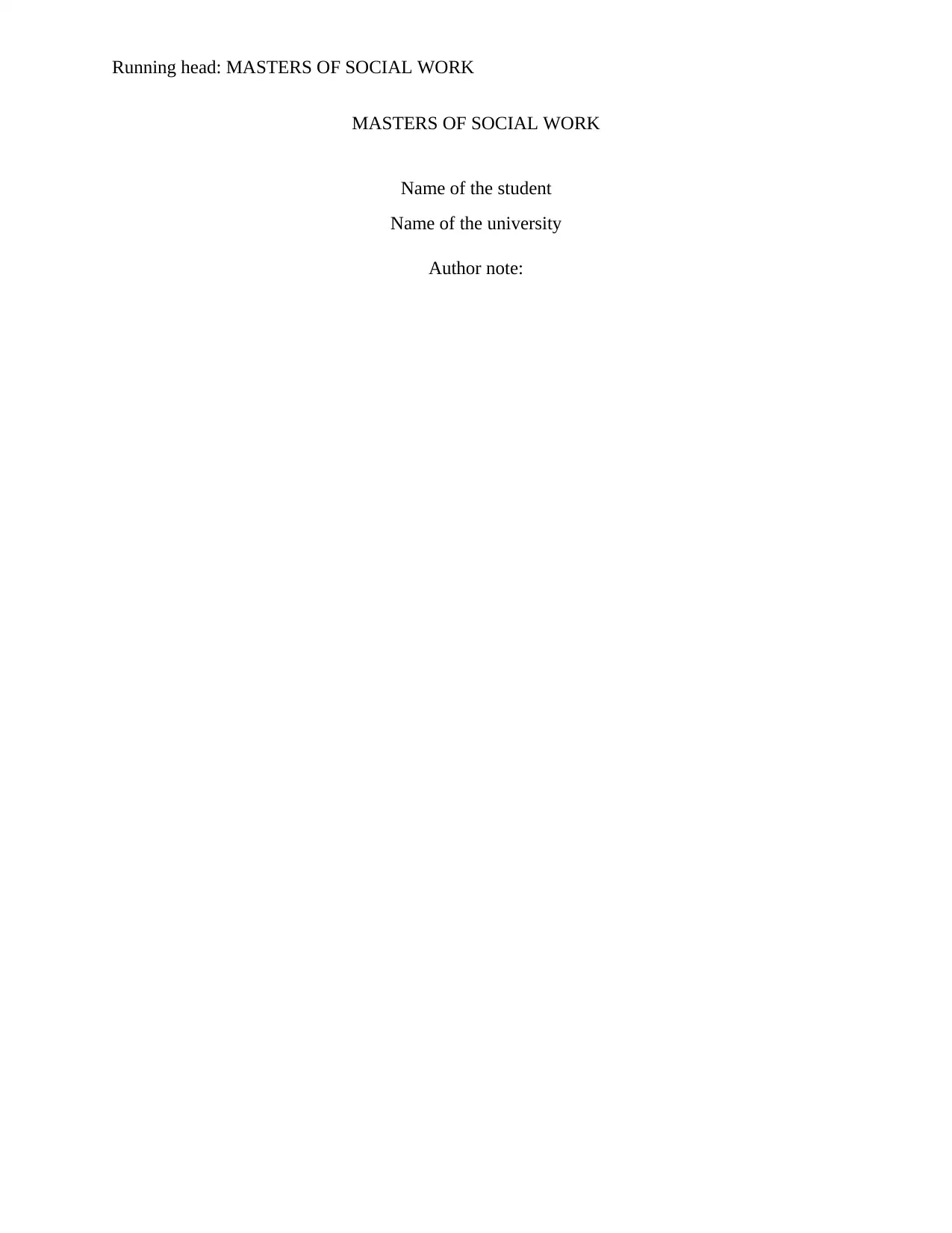
Running head: MASTERS OF SOCIAL WORK
MASTERS OF SOCIAL WORK
Name of the student
Name of the university
Author note:
MASTERS OF SOCIAL WORK
Name of the student
Name of the university
Author note:
Secure Best Marks with AI Grader
Need help grading? Try our AI Grader for instant feedback on your assignments.
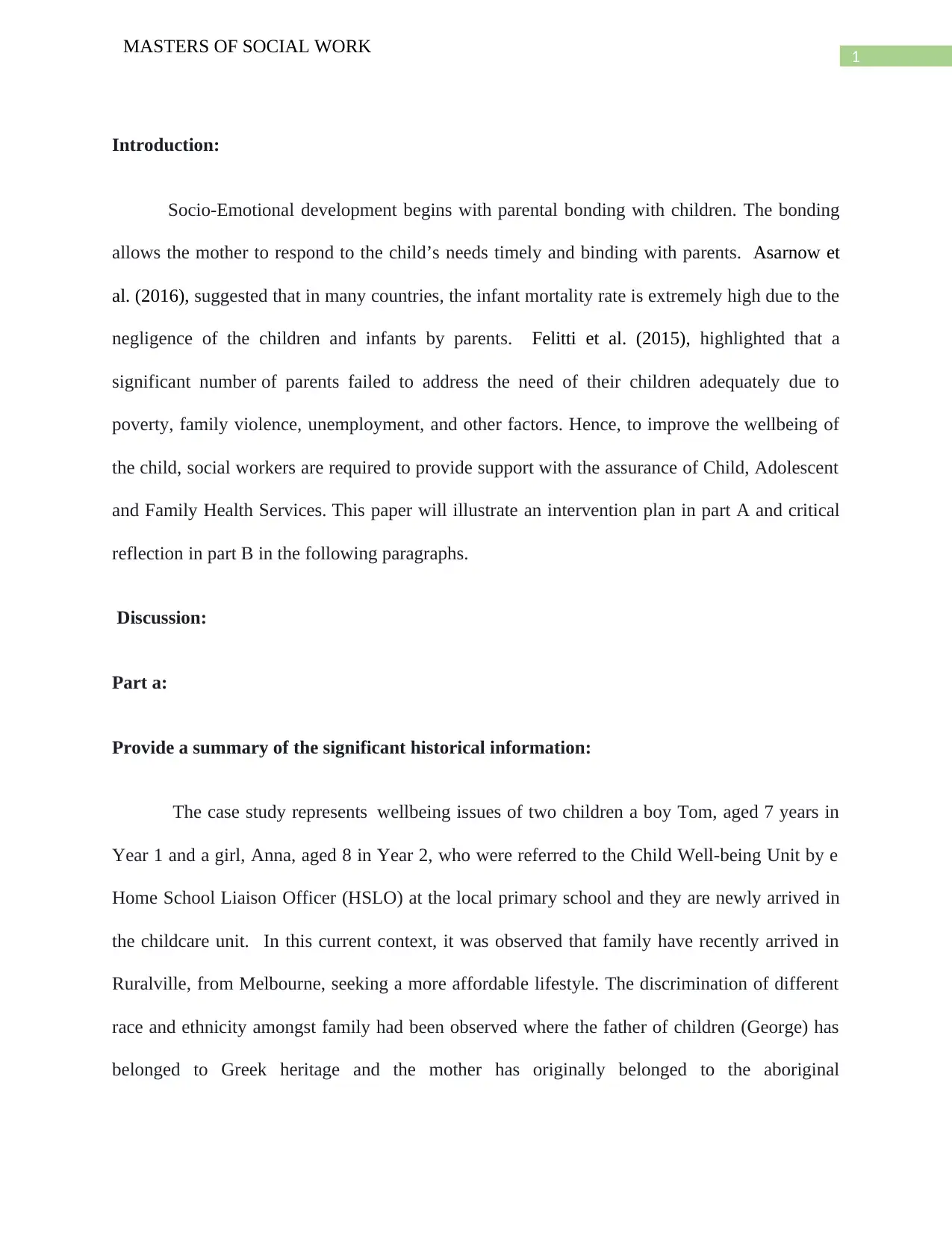
1
MASTERS OF SOCIAL WORK
Introduction:
Socio-Emotional development begins with parental bonding with children. The bonding
allows the mother to respond to the child’s needs timely and binding with parents. Asarnow et
al. (2016), suggested that in many countries, the infant mortality rate is extremely high due to the
negligence of the children and infants by parents. Felitti et al. (2015), highlighted that a
significant number of parents failed to address the need of their children adequately due to
poverty, family violence, unemployment, and other factors. Hence, to improve the wellbeing of
the child, social workers are required to provide support with the assurance of Child, Adolescent
and Family Health Services. This paper will illustrate an intervention plan in part A and critical
reflection in part B in the following paragraphs.
Discussion:
Part a:
Provide a summary of the significant historical information:
The case study represents wellbeing issues of two children a boy Tom, aged 7 years in
Year 1 and a girl, Anna, aged 8 in Year 2, who were referred to the Child Well-being Unit by e
Home School Liaison Officer (HSLO) at the local primary school and they are newly arrived in
the childcare unit. In this current context, it was observed that family have recently arrived in
Ruralville, from Melbourne, seeking a more affordable lifestyle. The discrimination of different
race and ethnicity amongst family had been observed where the father of children (George) has
belonged to Greek heritage and the mother has originally belonged to the aboriginal
MASTERS OF SOCIAL WORK
Introduction:
Socio-Emotional development begins with parental bonding with children. The bonding
allows the mother to respond to the child’s needs timely and binding with parents. Asarnow et
al. (2016), suggested that in many countries, the infant mortality rate is extremely high due to the
negligence of the children and infants by parents. Felitti et al. (2015), highlighted that a
significant number of parents failed to address the need of their children adequately due to
poverty, family violence, unemployment, and other factors. Hence, to improve the wellbeing of
the child, social workers are required to provide support with the assurance of Child, Adolescent
and Family Health Services. This paper will illustrate an intervention plan in part A and critical
reflection in part B in the following paragraphs.
Discussion:
Part a:
Provide a summary of the significant historical information:
The case study represents wellbeing issues of two children a boy Tom, aged 7 years in
Year 1 and a girl, Anna, aged 8 in Year 2, who were referred to the Child Well-being Unit by e
Home School Liaison Officer (HSLO) at the local primary school and they are newly arrived in
the childcare unit. In this current context, it was observed that family have recently arrived in
Ruralville, from Melbourne, seeking a more affordable lifestyle. The discrimination of different
race and ethnicity amongst family had been observed where the father of children (George) has
belonged to Greek heritage and the mother has originally belonged to the aboriginal
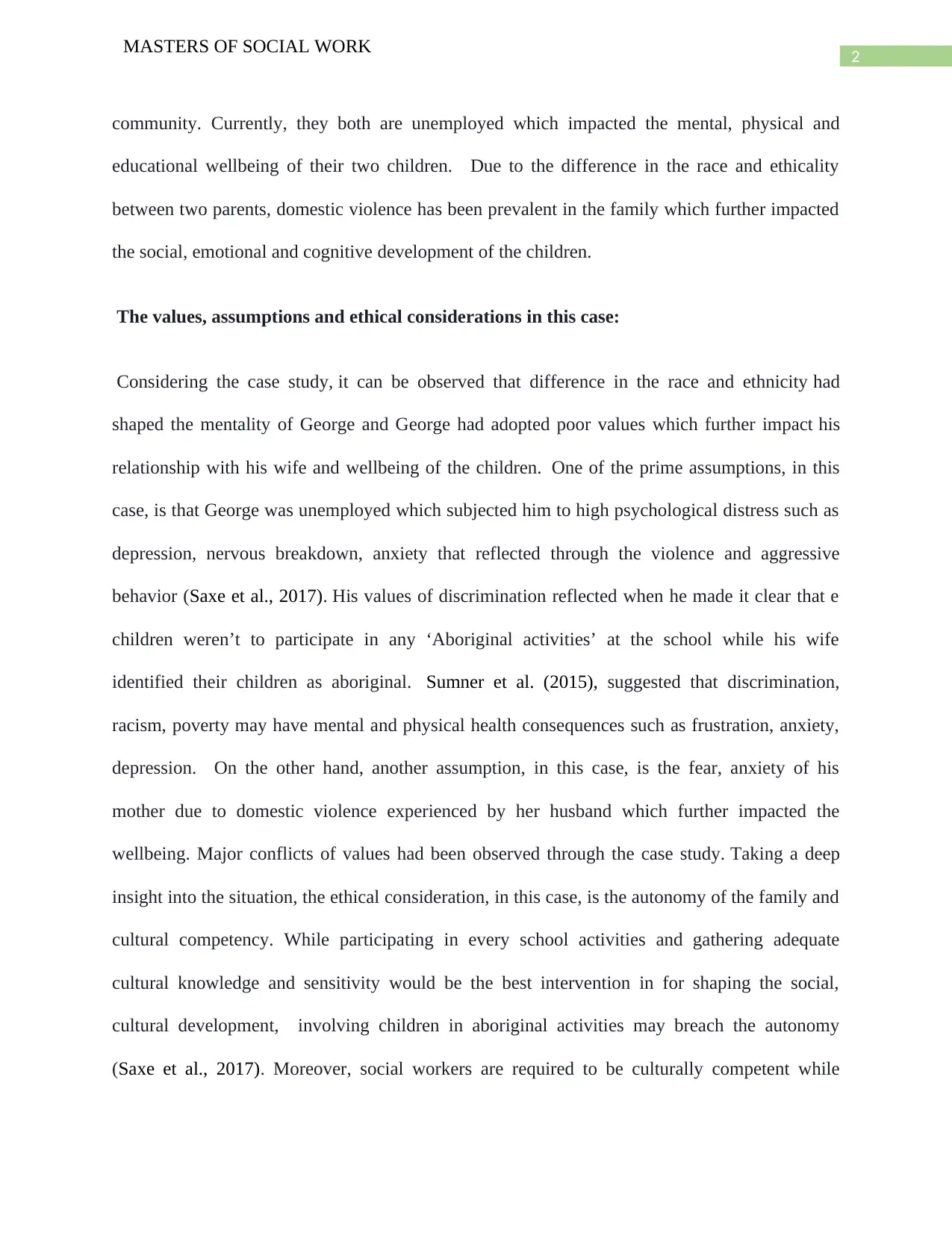
2
MASTERS OF SOCIAL WORK
community. Currently, they both are unemployed which impacted the mental, physical and
educational wellbeing of their two children. Due to the difference in the race and ethicality
between two parents, domestic violence has been prevalent in the family which further impacted
the social, emotional and cognitive development of the children.
The values, assumptions and ethical considerations in this case:
Considering the case study, it can be observed that difference in the race and ethnicity had
shaped the mentality of George and George had adopted poor values which further impact his
relationship with his wife and wellbeing of the children. One of the prime assumptions, in this
case, is that George was unemployed which subjected him to high psychological distress such as
depression, nervous breakdown, anxiety that reflected through the violence and aggressive
behavior (Saxe et al., 2017). His values of discrimination reflected when he made it clear that e
children weren’t to participate in any ‘Aboriginal activities’ at the school while his wife
identified their children as aboriginal. Sumner et al. (2015), suggested that discrimination,
racism, poverty may have mental and physical health consequences such as frustration, anxiety,
depression. On the other hand, another assumption, in this case, is the fear, anxiety of his
mother due to domestic violence experienced by her husband which further impacted the
wellbeing. Major conflicts of values had been observed through the case study. Taking a deep
insight into the situation, the ethical consideration, in this case, is the autonomy of the family and
cultural competency. While participating in every school activities and gathering adequate
cultural knowledge and sensitivity would be the best intervention in for shaping the social,
cultural development, involving children in aboriginal activities may breach the autonomy
(Saxe et al., 2017). Moreover, social workers are required to be culturally competent while
MASTERS OF SOCIAL WORK
community. Currently, they both are unemployed which impacted the mental, physical and
educational wellbeing of their two children. Due to the difference in the race and ethicality
between two parents, domestic violence has been prevalent in the family which further impacted
the social, emotional and cognitive development of the children.
The values, assumptions and ethical considerations in this case:
Considering the case study, it can be observed that difference in the race and ethnicity had
shaped the mentality of George and George had adopted poor values which further impact his
relationship with his wife and wellbeing of the children. One of the prime assumptions, in this
case, is that George was unemployed which subjected him to high psychological distress such as
depression, nervous breakdown, anxiety that reflected through the violence and aggressive
behavior (Saxe et al., 2017). His values of discrimination reflected when he made it clear that e
children weren’t to participate in any ‘Aboriginal activities’ at the school while his wife
identified their children as aboriginal. Sumner et al. (2015), suggested that discrimination,
racism, poverty may have mental and physical health consequences such as frustration, anxiety,
depression. On the other hand, another assumption, in this case, is the fear, anxiety of his
mother due to domestic violence experienced by her husband which further impacted the
wellbeing. Major conflicts of values had been observed through the case study. Taking a deep
insight into the situation, the ethical consideration, in this case, is the autonomy of the family and
cultural competency. While participating in every school activities and gathering adequate
cultural knowledge and sensitivity would be the best intervention in for shaping the social,
cultural development, involving children in aboriginal activities may breach the autonomy
(Saxe et al., 2017). Moreover, social workers are required to be culturally competent while
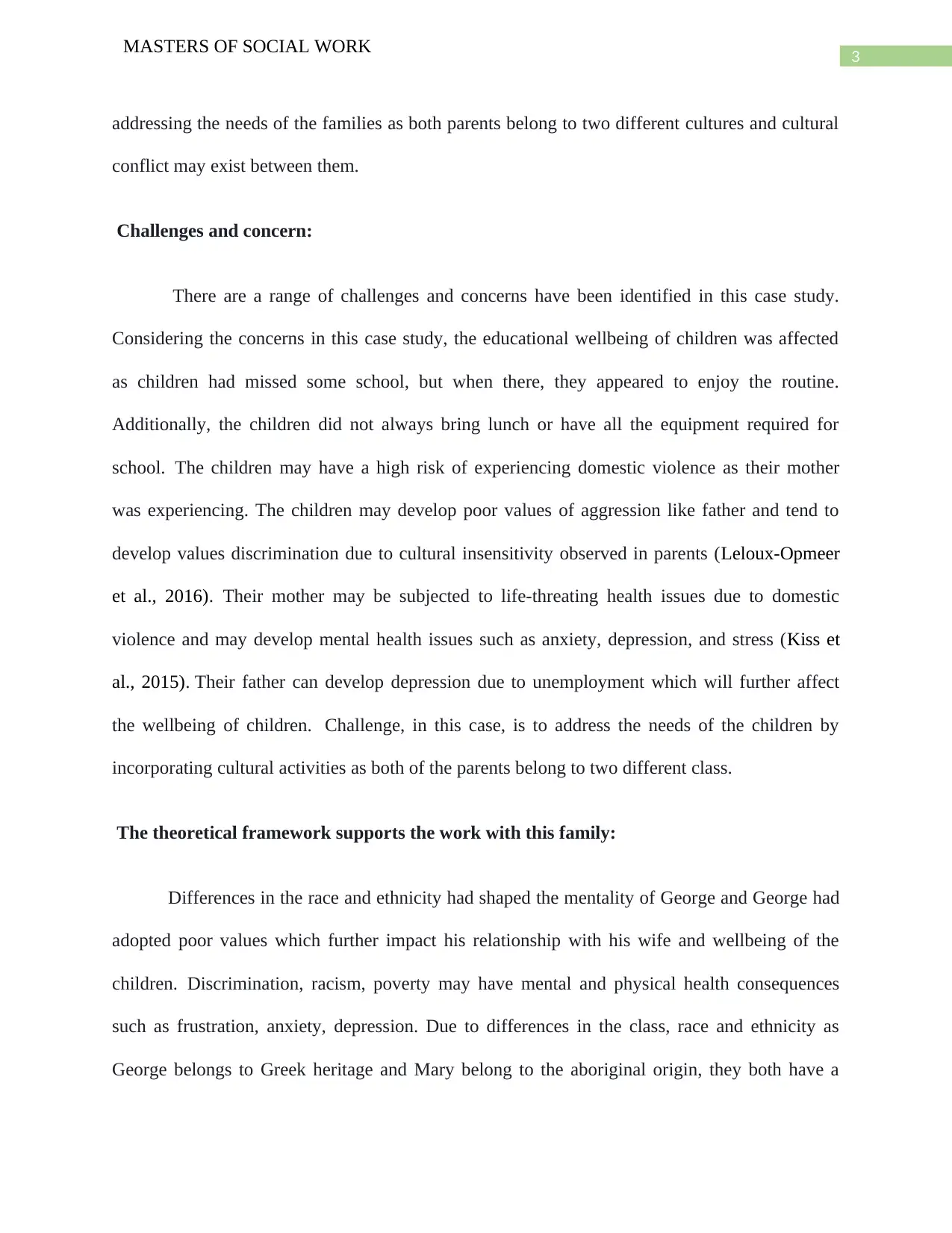
3
MASTERS OF SOCIAL WORK
addressing the needs of the families as both parents belong to two different cultures and cultural
conflict may exist between them.
Challenges and concern:
There are a range of challenges and concerns have been identified in this case study.
Considering the concerns in this case study, the educational wellbeing of children was affected
as children had missed some school, but when there, they appeared to enjoy the routine.
Additionally, the children did not always bring lunch or have all the equipment required for
school. The children may have a high risk of experiencing domestic violence as their mother
was experiencing. The children may develop poor values of aggression like father and tend to
develop values discrimination due to cultural insensitivity observed in parents (Leloux-Opmeer
et al., 2016). Their mother may be subjected to life-threating health issues due to domestic
violence and may develop mental health issues such as anxiety, depression, and stress (Kiss et
al., 2015). Their father can develop depression due to unemployment which will further affect
the wellbeing of children. Challenge, in this case, is to address the needs of the children by
incorporating cultural activities as both of the parents belong to two different class.
The theoretical framework supports the work with this family:
Differences in the race and ethnicity had shaped the mentality of George and George had
adopted poor values which further impact his relationship with his wife and wellbeing of the
children. Discrimination, racism, poverty may have mental and physical health consequences
such as frustration, anxiety, depression. Due to differences in the class, race and ethnicity as
George belongs to Greek heritage and Mary belong to the aboriginal origin, they both have a
MASTERS OF SOCIAL WORK
addressing the needs of the families as both parents belong to two different cultures and cultural
conflict may exist between them.
Challenges and concern:
There are a range of challenges and concerns have been identified in this case study.
Considering the concerns in this case study, the educational wellbeing of children was affected
as children had missed some school, but when there, they appeared to enjoy the routine.
Additionally, the children did not always bring lunch or have all the equipment required for
school. The children may have a high risk of experiencing domestic violence as their mother
was experiencing. The children may develop poor values of aggression like father and tend to
develop values discrimination due to cultural insensitivity observed in parents (Leloux-Opmeer
et al., 2016). Their mother may be subjected to life-threating health issues due to domestic
violence and may develop mental health issues such as anxiety, depression, and stress (Kiss et
al., 2015). Their father can develop depression due to unemployment which will further affect
the wellbeing of children. Challenge, in this case, is to address the needs of the children by
incorporating cultural activities as both of the parents belong to two different class.
The theoretical framework supports the work with this family:
Differences in the race and ethnicity had shaped the mentality of George and George had
adopted poor values which further impact his relationship with his wife and wellbeing of the
children. Discrimination, racism, poverty may have mental and physical health consequences
such as frustration, anxiety, depression. Due to differences in the class, race and ethnicity as
George belongs to Greek heritage and Mary belong to the aboriginal origin, they both have a
Secure Best Marks with AI Grader
Need help grading? Try our AI Grader for instant feedback on your assignments.
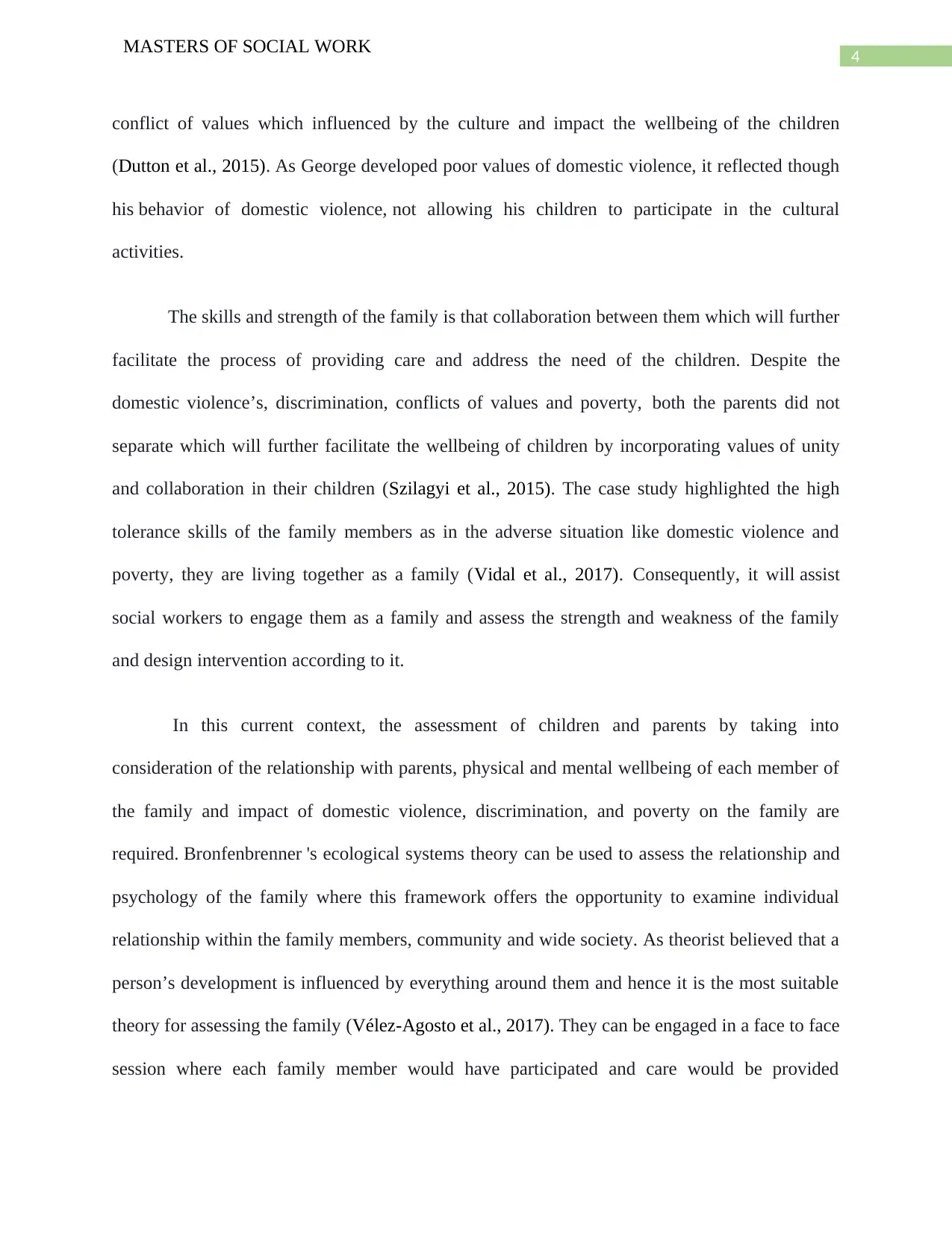
4
MASTERS OF SOCIAL WORK
conflict of values which influenced by the culture and impact the wellbeing of the children
(Dutton et al., 2015). As George developed poor values of domestic violence, it reflected though
his behavior of domestic violence, not allowing his children to participate in the cultural
activities.
The skills and strength of the family is that collaboration between them which will further
facilitate the process of providing care and address the need of the children. Despite the
domestic violence’s, discrimination, conflicts of values and poverty, both the parents did not
separate which will further facilitate the wellbeing of children by incorporating values of unity
and collaboration in their children (Szilagyi et al., 2015). The case study highlighted the high
tolerance skills of the family members as in the adverse situation like domestic violence and
poverty, they are living together as a family (Vidal et al., 2017). Consequently, it will assist
social workers to engage them as a family and assess the strength and weakness of the family
and design intervention according to it.
In this current context, the assessment of children and parents by taking into
consideration of the relationship with parents, physical and mental wellbeing of each member of
the family and impact of domestic violence, discrimination, and poverty on the family are
required. Bronfenbrenner 's ecological systems theory can be used to assess the relationship and
psychology of the family where this framework offers the opportunity to examine individual
relationship within the family members, community and wide society. As theorist believed that a
person’s development is influenced by everything around them and hence it is the most suitable
theory for assessing the family (Vélez-Agosto et al., 2017). They can be engaged in a face to face
session where each family member would have participated and care would be provided
MASTERS OF SOCIAL WORK
conflict of values which influenced by the culture and impact the wellbeing of the children
(Dutton et al., 2015). As George developed poor values of domestic violence, it reflected though
his behavior of domestic violence, not allowing his children to participate in the cultural
activities.
The skills and strength of the family is that collaboration between them which will further
facilitate the process of providing care and address the need of the children. Despite the
domestic violence’s, discrimination, conflicts of values and poverty, both the parents did not
separate which will further facilitate the wellbeing of children by incorporating values of unity
and collaboration in their children (Szilagyi et al., 2015). The case study highlighted the high
tolerance skills of the family members as in the adverse situation like domestic violence and
poverty, they are living together as a family (Vidal et al., 2017). Consequently, it will assist
social workers to engage them as a family and assess the strength and weakness of the family
and design intervention according to it.
In this current context, the assessment of children and parents by taking into
consideration of the relationship with parents, physical and mental wellbeing of each member of
the family and impact of domestic violence, discrimination, and poverty on the family are
required. Bronfenbrenner 's ecological systems theory can be used to assess the relationship and
psychology of the family where this framework offers the opportunity to examine individual
relationship within the family members, community and wide society. As theorist believed that a
person’s development is influenced by everything around them and hence it is the most suitable
theory for assessing the family (Vélez-Agosto et al., 2017). They can be engaged in a face to face
session where each family member would have participated and care would be provided
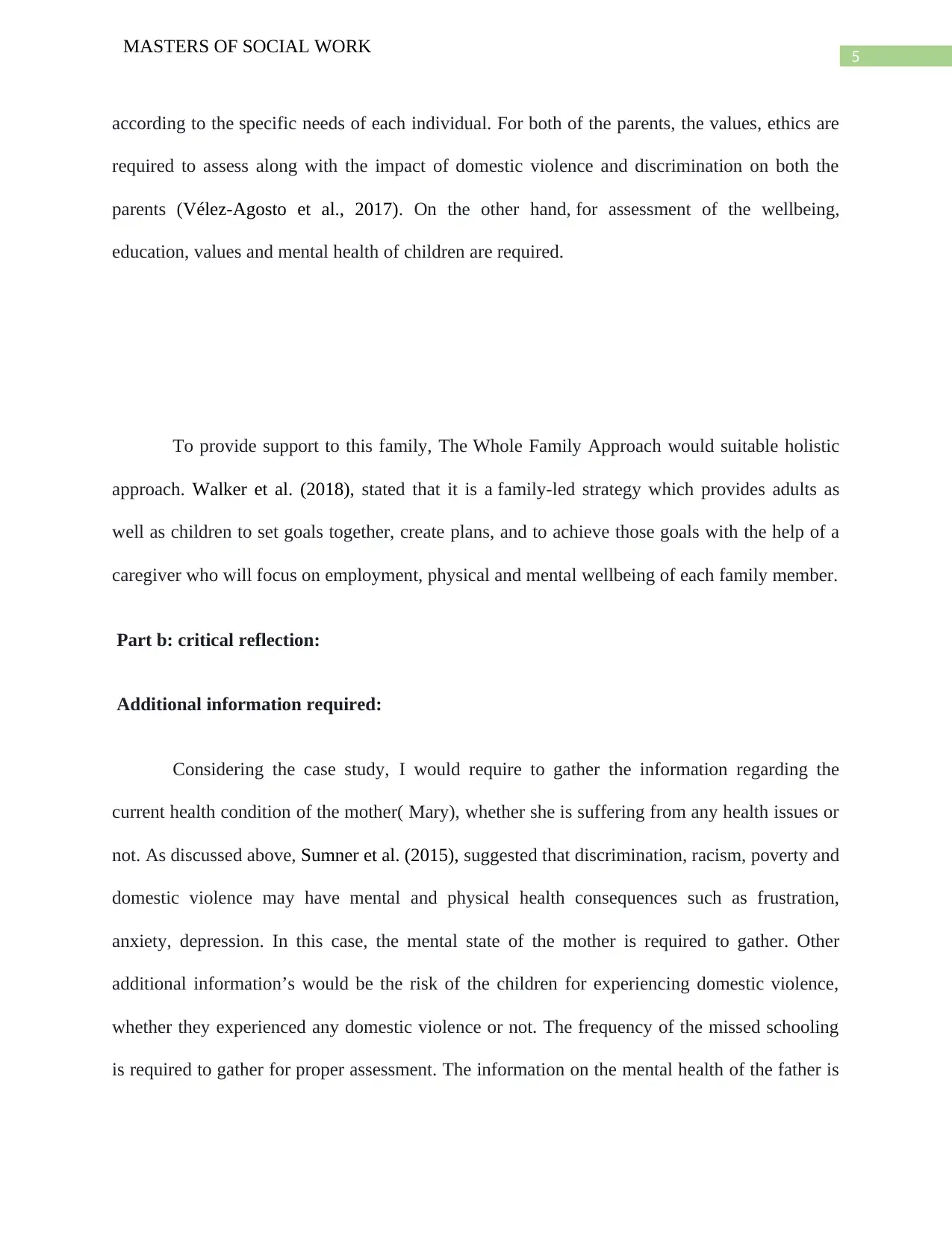
5
MASTERS OF SOCIAL WORK
according to the specific needs of each individual. For both of the parents, the values, ethics are
required to assess along with the impact of domestic violence and discrimination on both the
parents (Vélez-Agosto et al., 2017). On the other hand, for assessment of the wellbeing,
education, values and mental health of children are required.
To provide support to this family, The Whole Family Approach would suitable holistic
approach. Walker et al. (2018), stated that it is a family-led strategy which provides adults as
well as children to set goals together, create plans, and to achieve those goals with the help of a
caregiver who will focus on employment, physical and mental wellbeing of each family member.
Part b: critical reflection:
Additional information required:
Considering the case study, I would require to gather the information regarding the
current health condition of the mother( Mary), whether she is suffering from any health issues or
not. As discussed above, Sumner et al. (2015), suggested that discrimination, racism, poverty and
domestic violence may have mental and physical health consequences such as frustration,
anxiety, depression. In this case, the mental state of the mother is required to gather. Other
additional information’s would be the risk of the children for experiencing domestic violence,
whether they experienced any domestic violence or not. The frequency of the missed schooling
is required to gather for proper assessment. The information on the mental health of the father is
MASTERS OF SOCIAL WORK
according to the specific needs of each individual. For both of the parents, the values, ethics are
required to assess along with the impact of domestic violence and discrimination on both the
parents (Vélez-Agosto et al., 2017). On the other hand, for assessment of the wellbeing,
education, values and mental health of children are required.
To provide support to this family, The Whole Family Approach would suitable holistic
approach. Walker et al. (2018), stated that it is a family-led strategy which provides adults as
well as children to set goals together, create plans, and to achieve those goals with the help of a
caregiver who will focus on employment, physical and mental wellbeing of each family member.
Part b: critical reflection:
Additional information required:
Considering the case study, I would require to gather the information regarding the
current health condition of the mother( Mary), whether she is suffering from any health issues or
not. As discussed above, Sumner et al. (2015), suggested that discrimination, racism, poverty and
domestic violence may have mental and physical health consequences such as frustration,
anxiety, depression. In this case, the mental state of the mother is required to gather. Other
additional information’s would be the risk of the children for experiencing domestic violence,
whether they experienced any domestic violence or not. The frequency of the missed schooling
is required to gather for proper assessment. The information on the mental health of the father is
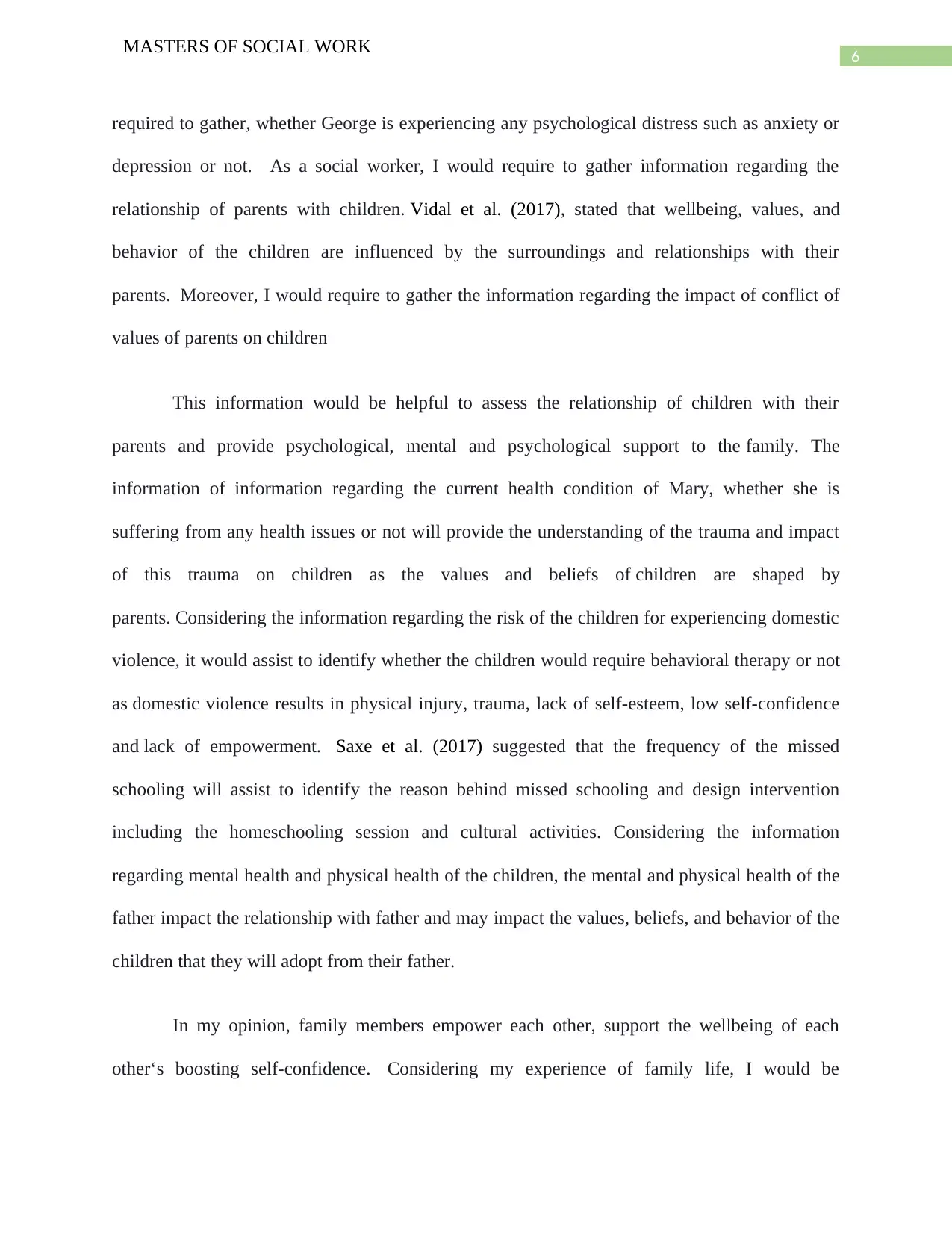
6
MASTERS OF SOCIAL WORK
required to gather, whether George is experiencing any psychological distress such as anxiety or
depression or not. As a social worker, I would require to gather information regarding the
relationship of parents with children. Vidal et al. (2017), stated that wellbeing, values, and
behavior of the children are influenced by the surroundings and relationships with their
parents. Moreover, I would require to gather the information regarding the impact of conflict of
values of parents on children
This information would be helpful to assess the relationship of children with their
parents and provide psychological, mental and psychological support to the family. The
information of information regarding the current health condition of Mary, whether she is
suffering from any health issues or not will provide the understanding of the trauma and impact
of this trauma on children as the values and beliefs of children are shaped by
parents. Considering the information regarding the risk of the children for experiencing domestic
violence, it would assist to identify whether the children would require behavioral therapy or not
as domestic violence results in physical injury, trauma, lack of self-esteem, low self-confidence
and lack of empowerment. Saxe et al. (2017) suggested that the frequency of the missed
schooling will assist to identify the reason behind missed schooling and design intervention
including the homeschooling session and cultural activities. Considering the information
regarding mental health and physical health of the children, the mental and physical health of the
father impact the relationship with father and may impact the values, beliefs, and behavior of the
children that they will adopt from their father.
In my opinion, family members empower each other, support the wellbeing of each
other‘s boosting self-confidence. Considering my experience of family life, I would be
MASTERS OF SOCIAL WORK
required to gather, whether George is experiencing any psychological distress such as anxiety or
depression or not. As a social worker, I would require to gather information regarding the
relationship of parents with children. Vidal et al. (2017), stated that wellbeing, values, and
behavior of the children are influenced by the surroundings and relationships with their
parents. Moreover, I would require to gather the information regarding the impact of conflict of
values of parents on children
This information would be helpful to assess the relationship of children with their
parents and provide psychological, mental and psychological support to the family. The
information of information regarding the current health condition of Mary, whether she is
suffering from any health issues or not will provide the understanding of the trauma and impact
of this trauma on children as the values and beliefs of children are shaped by
parents. Considering the information regarding the risk of the children for experiencing domestic
violence, it would assist to identify whether the children would require behavioral therapy or not
as domestic violence results in physical injury, trauma, lack of self-esteem, low self-confidence
and lack of empowerment. Saxe et al. (2017) suggested that the frequency of the missed
schooling will assist to identify the reason behind missed schooling and design intervention
including the homeschooling session and cultural activities. Considering the information
regarding mental health and physical health of the children, the mental and physical health of the
father impact the relationship with father and may impact the values, beliefs, and behavior of the
children that they will adopt from their father.
In my opinion, family members empower each other, support the wellbeing of each
other‘s boosting self-confidence. Considering my experience of family life, I would be
Paraphrase This Document
Need a fresh take? Get an instant paraphrase of this document with our AI Paraphraser
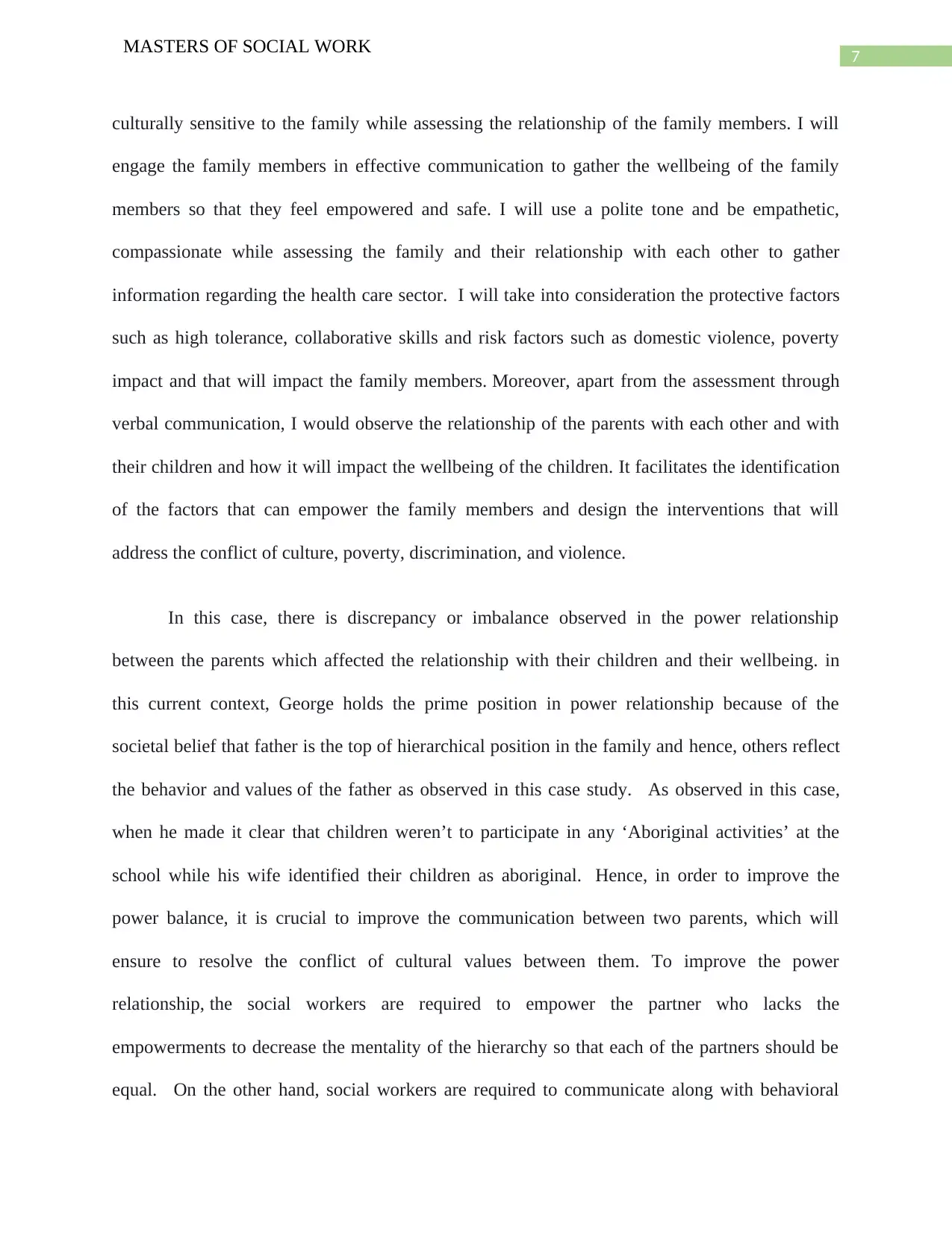
7
MASTERS OF SOCIAL WORK
culturally sensitive to the family while assessing the relationship of the family members. I will
engage the family members in effective communication to gather the wellbeing of the family
members so that they feel empowered and safe. I will use a polite tone and be empathetic,
compassionate while assessing the family and their relationship with each other to gather
information regarding the health care sector. I will take into consideration the protective factors
such as high tolerance, collaborative skills and risk factors such as domestic violence, poverty
impact and that will impact the family members. Moreover, apart from the assessment through
verbal communication, I would observe the relationship of the parents with each other and with
their children and how it will impact the wellbeing of the children. It facilitates the identification
of the factors that can empower the family members and design the interventions that will
address the conflict of culture, poverty, discrimination, and violence.
In this case, there is discrepancy or imbalance observed in the power relationship
between the parents which affected the relationship with their children and their wellbeing. in
this current context, George holds the prime position in power relationship because of the
societal belief that father is the top of hierarchical position in the family and hence, others reflect
the behavior and values of the father as observed in this case study. As observed in this case,
when he made it clear that children weren’t to participate in any ‘Aboriginal activities’ at the
school while his wife identified their children as aboriginal. Hence, in order to improve the
power balance, it is crucial to improve the communication between two parents, which will
ensure to resolve the conflict of cultural values between them. To improve the power
relationship, the social workers are required to empower the partner who lacks the
empowerments to decrease the mentality of the hierarchy so that each of the partners should be
equal. On the other hand, social workers are required to communicate along with behavioral
MASTERS OF SOCIAL WORK
culturally sensitive to the family while assessing the relationship of the family members. I will
engage the family members in effective communication to gather the wellbeing of the family
members so that they feel empowered and safe. I will use a polite tone and be empathetic,
compassionate while assessing the family and their relationship with each other to gather
information regarding the health care sector. I will take into consideration the protective factors
such as high tolerance, collaborative skills and risk factors such as domestic violence, poverty
impact and that will impact the family members. Moreover, apart from the assessment through
verbal communication, I would observe the relationship of the parents with each other and with
their children and how it will impact the wellbeing of the children. It facilitates the identification
of the factors that can empower the family members and design the interventions that will
address the conflict of culture, poverty, discrimination, and violence.
In this case, there is discrepancy or imbalance observed in the power relationship
between the parents which affected the relationship with their children and their wellbeing. in
this current context, George holds the prime position in power relationship because of the
societal belief that father is the top of hierarchical position in the family and hence, others reflect
the behavior and values of the father as observed in this case study. As observed in this case,
when he made it clear that children weren’t to participate in any ‘Aboriginal activities’ at the
school while his wife identified their children as aboriginal. Hence, in order to improve the
power balance, it is crucial to improve the communication between two parents, which will
ensure to resolve the conflict of cultural values between them. To improve the power
relationship, the social workers are required to empower the partner who lacks the
empowerments to decrease the mentality of the hierarchy so that each of the partners should be
equal. On the other hand, social workers are required to communicate along with behavioral
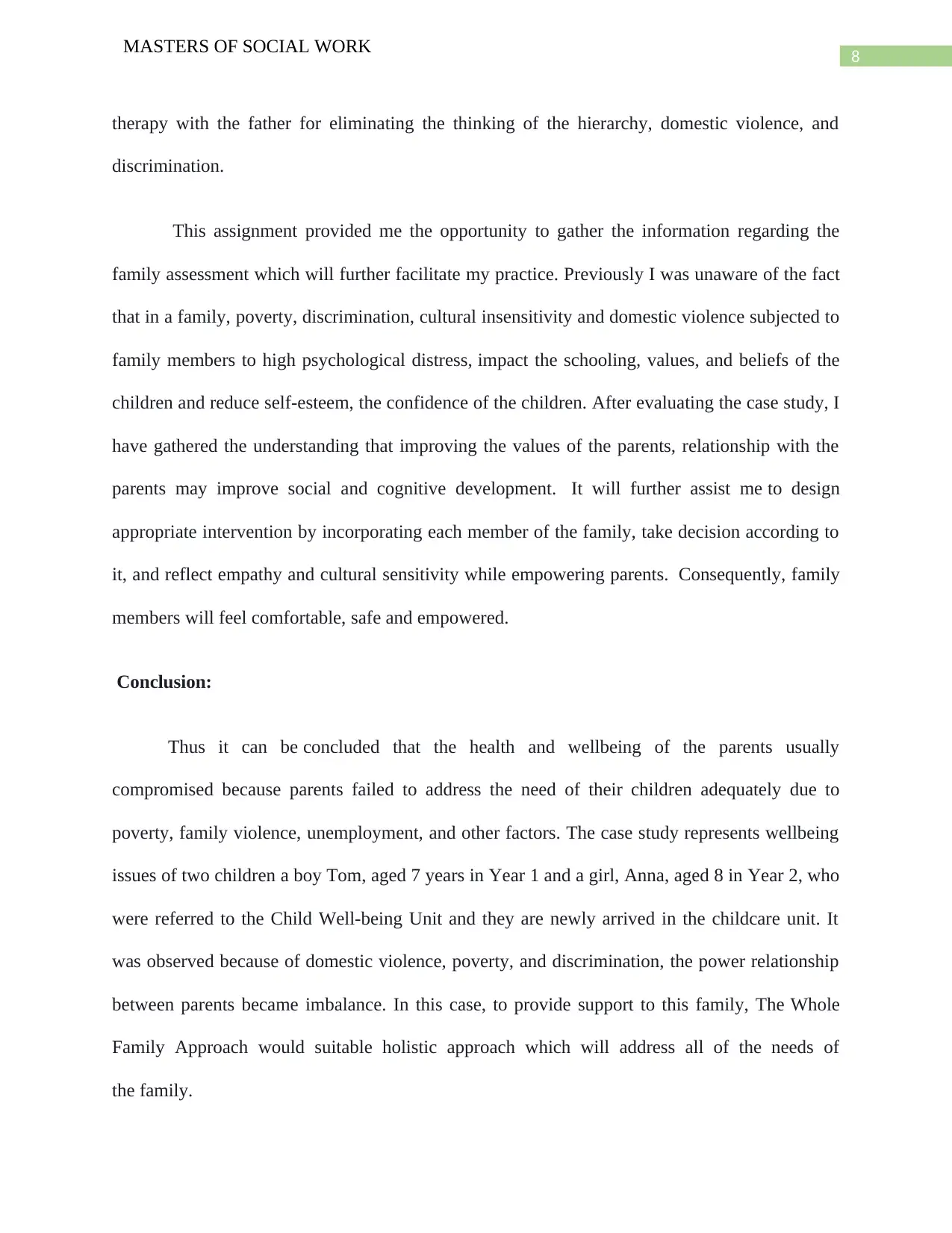
8
MASTERS OF SOCIAL WORK
therapy with the father for eliminating the thinking of the hierarchy, domestic violence, and
discrimination.
This assignment provided me the opportunity to gather the information regarding the
family assessment which will further facilitate my practice. Previously I was unaware of the fact
that in a family, poverty, discrimination, cultural insensitivity and domestic violence subjected to
family members to high psychological distress, impact the schooling, values, and beliefs of the
children and reduce self-esteem, the confidence of the children. After evaluating the case study, I
have gathered the understanding that improving the values of the parents, relationship with the
parents may improve social and cognitive development. It will further assist me to design
appropriate intervention by incorporating each member of the family, take decision according to
it, and reflect empathy and cultural sensitivity while empowering parents. Consequently, family
members will feel comfortable, safe and empowered.
Conclusion:
Thus it can be concluded that the health and wellbeing of the parents usually
compromised because parents failed to address the need of their children adequately due to
poverty, family violence, unemployment, and other factors. The case study represents wellbeing
issues of two children a boy Tom, aged 7 years in Year 1 and a girl, Anna, aged 8 in Year 2, who
were referred to the Child Well-being Unit and they are newly arrived in the childcare unit. It
was observed because of domestic violence, poverty, and discrimination, the power relationship
between parents became imbalance. In this case, to provide support to this family, The Whole
Family Approach would suitable holistic approach which will address all of the needs of
the family.
MASTERS OF SOCIAL WORK
therapy with the father for eliminating the thinking of the hierarchy, domestic violence, and
discrimination.
This assignment provided me the opportunity to gather the information regarding the
family assessment which will further facilitate my practice. Previously I was unaware of the fact
that in a family, poverty, discrimination, cultural insensitivity and domestic violence subjected to
family members to high psychological distress, impact the schooling, values, and beliefs of the
children and reduce self-esteem, the confidence of the children. After evaluating the case study, I
have gathered the understanding that improving the values of the parents, relationship with the
parents may improve social and cognitive development. It will further assist me to design
appropriate intervention by incorporating each member of the family, take decision according to
it, and reflect empathy and cultural sensitivity while empowering parents. Consequently, family
members will feel comfortable, safe and empowered.
Conclusion:
Thus it can be concluded that the health and wellbeing of the parents usually
compromised because parents failed to address the need of their children adequately due to
poverty, family violence, unemployment, and other factors. The case study represents wellbeing
issues of two children a boy Tom, aged 7 years in Year 1 and a girl, Anna, aged 8 in Year 2, who
were referred to the Child Well-being Unit and they are newly arrived in the childcare unit. It
was observed because of domestic violence, poverty, and discrimination, the power relationship
between parents became imbalance. In this case, to provide support to this family, The Whole
Family Approach would suitable holistic approach which will address all of the needs of
the family.

9
MASTERS OF SOCIAL WORK
MASTERS OF SOCIAL WORK
Secure Best Marks with AI Grader
Need help grading? Try our AI Grader for instant feedback on your assignments.
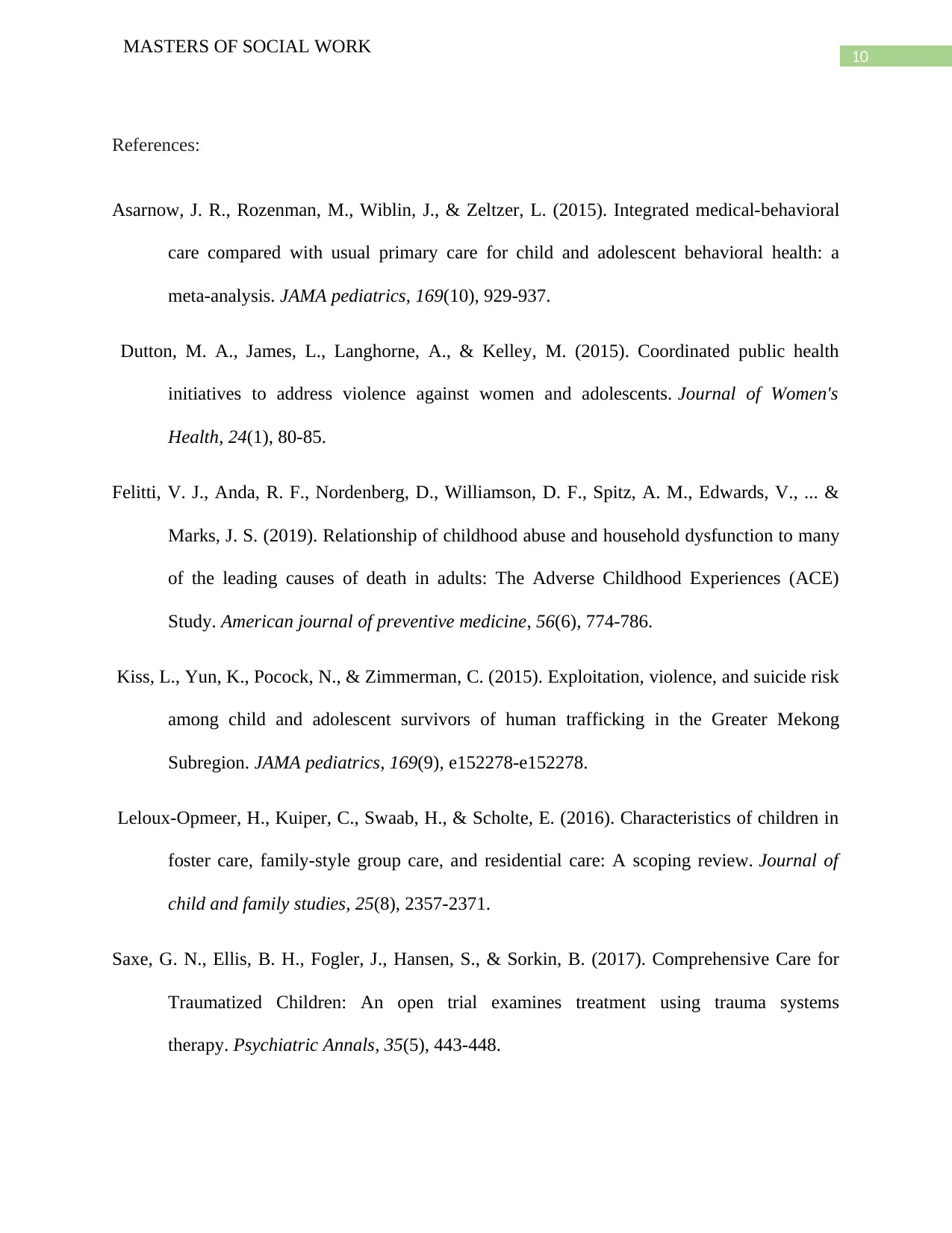
10
MASTERS OF SOCIAL WORK
References:
Asarnow, J. R., Rozenman, M., Wiblin, J., & Zeltzer, L. (2015). Integrated medical-behavioral
care compared with usual primary care for child and adolescent behavioral health: a
meta-analysis. JAMA pediatrics, 169(10), 929-937.
Dutton, M. A., James, L., Langhorne, A., & Kelley, M. (2015). Coordinated public health
initiatives to address violence against women and adolescents. Journal of Women's
Health, 24(1), 80-85.
Felitti, V. J., Anda, R. F., Nordenberg, D., Williamson, D. F., Spitz, A. M., Edwards, V., ... &
Marks, J. S. (2019). Relationship of childhood abuse and household dysfunction to many
of the leading causes of death in adults: The Adverse Childhood Experiences (ACE)
Study. American journal of preventive medicine, 56(6), 774-786.
Kiss, L., Yun, K., Pocock, N., & Zimmerman, C. (2015). Exploitation, violence, and suicide risk
among child and adolescent survivors of human trafficking in the Greater Mekong
Subregion. JAMA pediatrics, 169(9), e152278-e152278.
Leloux-Opmeer, H., Kuiper, C., Swaab, H., & Scholte, E. (2016). Characteristics of children in
foster care, family-style group care, and residential care: A scoping review. Journal of
child and family studies, 25(8), 2357-2371.
Saxe, G. N., Ellis, B. H., Fogler, J., Hansen, S., & Sorkin, B. (2017). Comprehensive Care for
Traumatized Children: An open trial examines treatment using trauma systems
therapy. Psychiatric Annals, 35(5), 443-448.
MASTERS OF SOCIAL WORK
References:
Asarnow, J. R., Rozenman, M., Wiblin, J., & Zeltzer, L. (2015). Integrated medical-behavioral
care compared with usual primary care for child and adolescent behavioral health: a
meta-analysis. JAMA pediatrics, 169(10), 929-937.
Dutton, M. A., James, L., Langhorne, A., & Kelley, M. (2015). Coordinated public health
initiatives to address violence against women and adolescents. Journal of Women's
Health, 24(1), 80-85.
Felitti, V. J., Anda, R. F., Nordenberg, D., Williamson, D. F., Spitz, A. M., Edwards, V., ... &
Marks, J. S. (2019). Relationship of childhood abuse and household dysfunction to many
of the leading causes of death in adults: The Adverse Childhood Experiences (ACE)
Study. American journal of preventive medicine, 56(6), 774-786.
Kiss, L., Yun, K., Pocock, N., & Zimmerman, C. (2015). Exploitation, violence, and suicide risk
among child and adolescent survivors of human trafficking in the Greater Mekong
Subregion. JAMA pediatrics, 169(9), e152278-e152278.
Leloux-Opmeer, H., Kuiper, C., Swaab, H., & Scholte, E. (2016). Characteristics of children in
foster care, family-style group care, and residential care: A scoping review. Journal of
child and family studies, 25(8), 2357-2371.
Saxe, G. N., Ellis, B. H., Fogler, J., Hansen, S., & Sorkin, B. (2017). Comprehensive Care for
Traumatized Children: An open trial examines treatment using trauma systems
therapy. Psychiatric Annals, 35(5), 443-448.
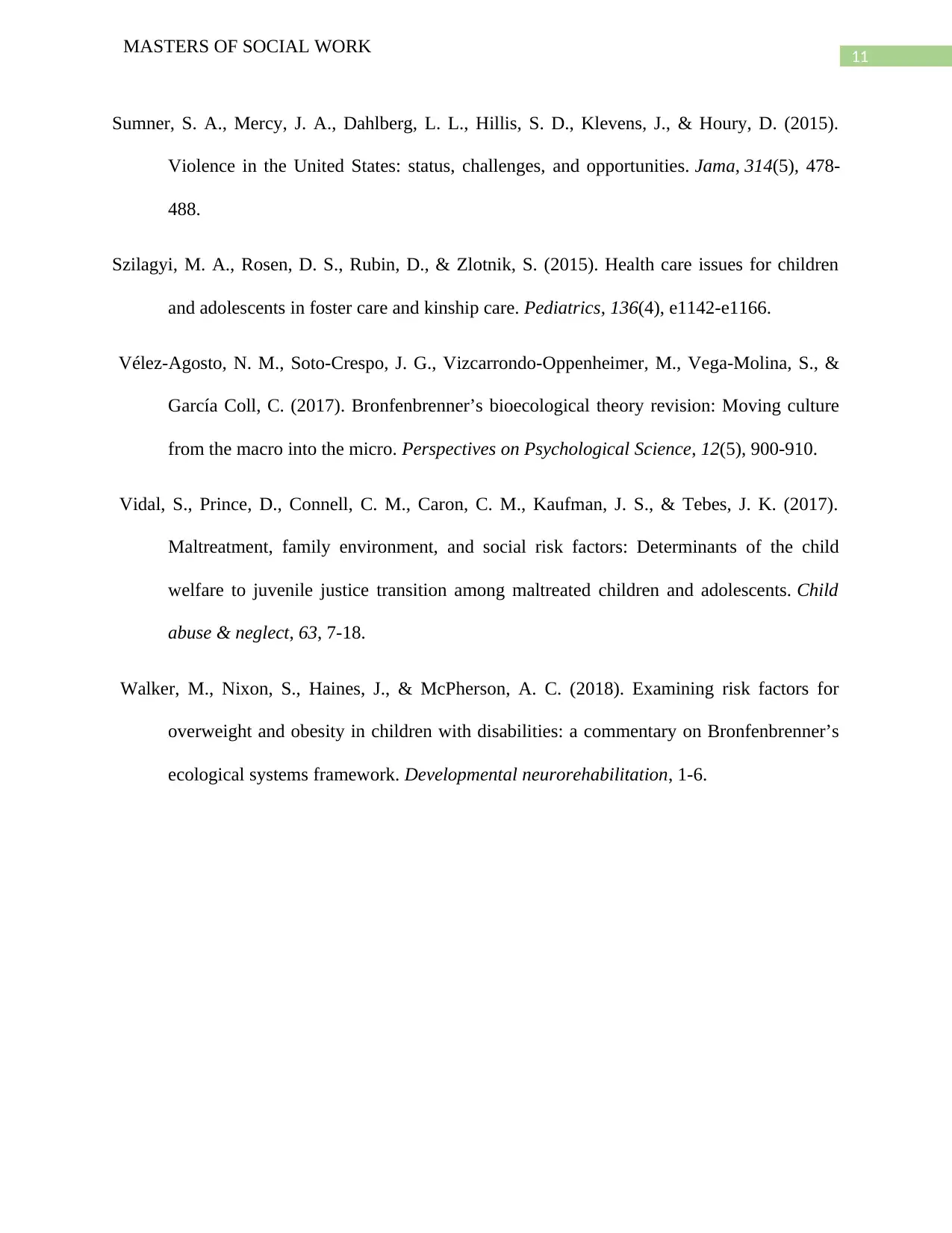
11
MASTERS OF SOCIAL WORK
Sumner, S. A., Mercy, J. A., Dahlberg, L. L., Hillis, S. D., Klevens, J., & Houry, D. (2015).
Violence in the United States: status, challenges, and opportunities. Jama, 314(5), 478-
488.
Szilagyi, M. A., Rosen, D. S., Rubin, D., & Zlotnik, S. (2015). Health care issues for children
and adolescents in foster care and kinship care. Pediatrics, 136(4), e1142-e1166.
Vélez-Agosto, N. M., Soto-Crespo, J. G., Vizcarrondo-Oppenheimer, M., Vega-Molina, S., &
García Coll, C. (2017). Bronfenbrenner’s bioecological theory revision: Moving culture
from the macro into the micro. Perspectives on Psychological Science, 12(5), 900-910.
Vidal, S., Prince, D., Connell, C. M., Caron, C. M., Kaufman, J. S., & Tebes, J. K. (2017).
Maltreatment, family environment, and social risk factors: Determinants of the child
welfare to juvenile justice transition among maltreated children and adolescents. Child
abuse & neglect, 63, 7-18.
Walker, M., Nixon, S., Haines, J., & McPherson, A. C. (2018). Examining risk factors for
overweight and obesity in children with disabilities: a commentary on Bronfenbrenner’s
ecological systems framework. Developmental neurorehabilitation, 1-6.
MASTERS OF SOCIAL WORK
Sumner, S. A., Mercy, J. A., Dahlberg, L. L., Hillis, S. D., Klevens, J., & Houry, D. (2015).
Violence in the United States: status, challenges, and opportunities. Jama, 314(5), 478-
488.
Szilagyi, M. A., Rosen, D. S., Rubin, D., & Zlotnik, S. (2015). Health care issues for children
and adolescents in foster care and kinship care. Pediatrics, 136(4), e1142-e1166.
Vélez-Agosto, N. M., Soto-Crespo, J. G., Vizcarrondo-Oppenheimer, M., Vega-Molina, S., &
García Coll, C. (2017). Bronfenbrenner’s bioecological theory revision: Moving culture
from the macro into the micro. Perspectives on Psychological Science, 12(5), 900-910.
Vidal, S., Prince, D., Connell, C. M., Caron, C. M., Kaufman, J. S., & Tebes, J. K. (2017).
Maltreatment, family environment, and social risk factors: Determinants of the child
welfare to juvenile justice transition among maltreated children and adolescents. Child
abuse & neglect, 63, 7-18.
Walker, M., Nixon, S., Haines, J., & McPherson, A. C. (2018). Examining risk factors for
overweight and obesity in children with disabilities: a commentary on Bronfenbrenner’s
ecological systems framework. Developmental neurorehabilitation, 1-6.
1 out of 12
Related Documents
Your All-in-One AI-Powered Toolkit for Academic Success.
+13062052269
info@desklib.com
Available 24*7 on WhatsApp / Email
![[object Object]](/_next/static/media/star-bottom.7253800d.svg)
Unlock your academic potential
© 2024 | Zucol Services PVT LTD | All rights reserved.





